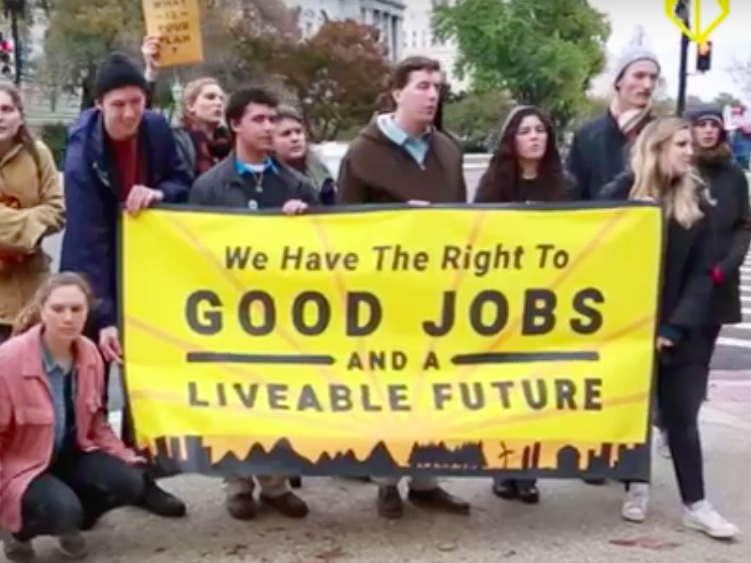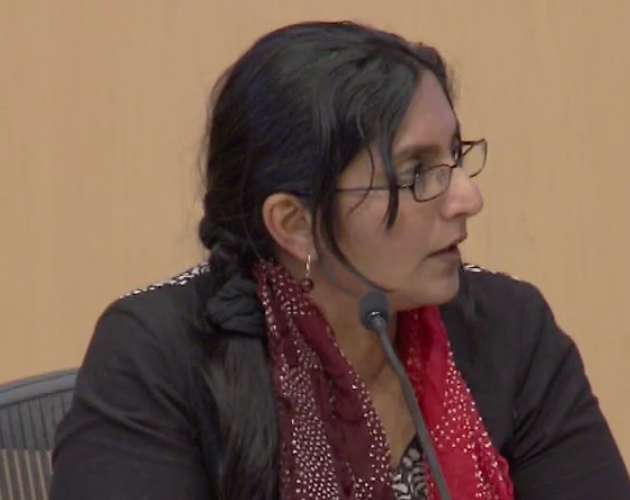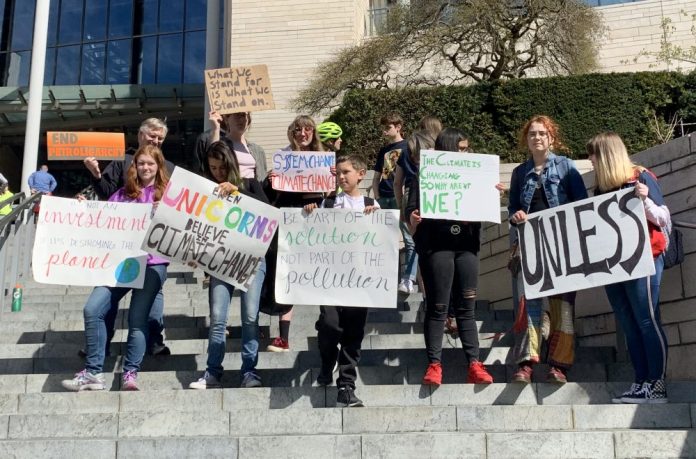“We’re on the right side of history, the Green New Deal,” sang the Seattle Raging Grannies during public comment at the beginning of yesterday’s Sustainability and Transportation Committee meeting. The grannies, who sing songs for social change, brought a spark of optimism to the serious topic of the climate crisis, which Councilmember Mike O’Brien, long a champion of environmental causes on the council, appears to be taking on with zeal during his final months in elected office.
Councilmember O’Brien has sponsored two important pieces of Green New Deal legislation that are planned to go to a full City Council vote next Monday. This vote comes a little over a month after the Council voted unanimously to endorse the Seattle Green New Deal, representing a potentially rapid turn toward climate action for a city that first recognized the “crisis of global warming” in a resolution passed back in 1992.

In press conference held directly before the committee meeting, organizers with 350 Seattle and Got Green demanded that the City Council take immediate action by calling for the City Council to follow in King County’s lead and pass an immediate moratorium on all new fossil fuel infrastructure in the city and Port of Seattle. The organizers have also called for Seattle to follow Berkeley’s example and prohibit fossil fuels from being connected to new residential and commercial buildings. Last month, Berkeley became the first U.S. city to ban natural gas in new low-rise buildings and homes.
“The first step to getting out of the climate hole is to stop digging it deeper,” said Jess Wallach, a 350 Seattle organizer who helped lead the King County campaign. Wallach was also a presenter during the discussion of resolution that would outline the Green New Deal’s specific goals and identifies actions necessary to meet those goals. Also discussed at the meeting was an ordinance which would establish a Green New Deal Oversight Board as well as an interdepartmental team to advance the Green New Deal policies and programs.
While an initial framework for the Green New Deal seems to be taking shape, many important details remain to be defined. Councilmember O’Brien has also called on the public to contribute their thoughts and opinions on the proposed legislation prior to Monday’s vote, and he has pledged continued public engagement and responsiveness throughout process of transforming the Green New Deal from vision to action.
A long list of possible Green New Deal initiatives
Some critics, like Kevin Schofield of SCC Insight, have argued that the current resolution includes a “kitchen sink” list of initiatives. The list is undeniably long, too long, in fact to include in full here. However, the question remains open as to whether or not now is the right time to begin reducing the number of proposed actions that could be used to achieve the Green New Deal’s goals.

Those goals, which were modeled after the Sunrise Movement’s Federal Green New Deal, include:
- Make Seattle free of pollutants that cause shifts in climate patterns, such as carbon dioxide, black carbon, methane, nitrogen oxides, and fluorinated gases, by 2030;
- Prioritize investment in communities most harmed by economic, racial, and environmental injustices;
- Advance an equitable transition from an economy that is based on extraction and exploitation to one that is based on regeneration and cooperation;
- Ensure those with the least amount of power and wealth are positioned to lead during this transition; and
- Create stable, livable-wage jobs that prioritize local hires, and protect jobs covered by Project Labor Agreements and Labor Harmony Agreements.
All of the Green New Deal goals are ambitious; in particular the third and fourth items would arguably require substantial social and economic paradigm shifts around power and capital.
That is probably why the long action list includes policy proposals that range from very general, such as decreasing use of fossil fuels in homes and promoting community food production, to others that are highly specific and difficult to concretely visualize at this time.
One example that falls into this category is the call to develop options for community-scale, community-owned, distributed generation of electricity in low-income communities. In her presentation to the committee, Lavanya Madhusudan, a legislative aide to Councilmember O’Brien, also called for such electricity to be “local, renewable, and non-extractive.” While the goal is certainly laudable, including such a policy proposal indicates that the emphasis currently remains focused on what is visionary rather than pragmatic.
One action policy is that is gaining attention is a strategy to develop Green Zones, which would receive priority for public investment. Neighborhoods targeted for Green Zone investment which include those that have “historically been underinvested and disproportionately burdened by environmental hazards and other injustices.”

An oversight board accountable to the most impacted communities
An ordinance accompanying the resolution calls for the establishment of a Green New Deal Oversight Board to advise and support City efforts. The board would include:
- Eight community representatives directly impacted by racial, economic, and environmental injustices (including one tribal member and two individuals between the ages of 16 and 25 at the time of their appointment);
- Three representatives of environmental justice organizations;
- Two representatives of labor unions; and
- Three representatives with experience in greenhouse gas reduction and climate resiliency strategies relevant to cities (e.g., public health, infrastructure, sea-level rise, and extreme weather events).
Board members would serve for three year terms, with a limit of two consecutive terms. Recognizing that board membership is often out of reach for working Seattleites, a compensation rate of $50 per hour would be made available for members for whom participating on the Board would be a financial hardship.
The proposed legislation also requests that the Office of Sustainability and the Environment form an interdepartmental team to help implement the Green New Deal and to support development of individual climate plans for all City departments.
A work in progress
Underscoring the fact that the resolution is still a work in progress, during the committee meeting Councilmember Kshama Sawant raised several suggestions for revising language in different sections of the resolution. She questioned the notion of an equitable congestion tax, stating that as an economist she could not think of any example of equitable congestion pricing. “I’ll state for the record that I don’t think there is a way,” said Councilmember Sawant, “but if [a congestion tax] were to be equitable, I would support it.”

Councilmember Sawant also called for including explicit language about taxing big business and establishing other progressive revenue sources in order to fund the Green New Deal initiatives.
Councilmember Abel Pacheco suggested that he would put forth an amendment that would include language about limiting single use plastics and revisiting policies around landmark preservation to limit potential impact on transit oriented development. He also called for the City to spread its message across city lines. “We need to build additional momentum for what both the county and state can do. The wealthiest among us are across the lake,” Councilmember Pacheco said.
While the resolution and ordinance will go to the full City Council for a vote on Monday, it is clear that these steps are intended to be the beginning of much longer conversation. Councilmember O’Brien has committed to getting a final draft available for the public to view by this Friday, creating a short turn around for public comment and review.
Readers who would like to share their thoughts can review the current draft proposal here and email their feedback to Councilmember O’Brien’s office.
Natalie Bicknell Argerious (she/her) is a reporter and podcast host at The Urbanist. She previously served as managing editor. A passionate urban explorer since childhood, she loves learning how to make cities more inclusive, vibrant, and environmentally resilient. You can often find her wandering around Seattle's Central District and Capitol Hill with her dogs and cat. Email her at natalie [at] theurbanist [dot] org.



